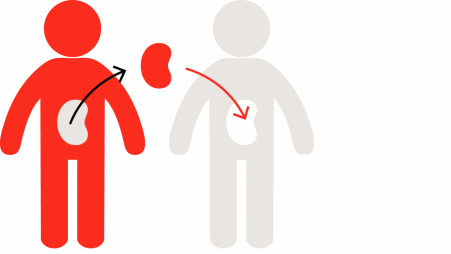Nephews, nieces to be in kidney donor pool
Despite the need for approximately 5,000 kidney transplants annually, only about 400 are performed

Highlights:
- 3.8cr Bangladeshis suffer from kidney disease, with high rates of permanent failure
- Only 400 kidney transplants occur yearly, far short of the 5,000 needed
- Current law permits 22 types of relatives to donate kidneys
- Ministry is also considering allowing "kidney swaps"
- Database for incompatible donor-recipient pairs will support kidney swaps
- Govt aims to boost transplants from brain-dead patients
- Incentives, recognition for organ donors are under consideration
The government is set to amend its law to expand the pool of potential kidney donors by including nephews and nieces as close relatives. This change is aimed at easing the process of kidney transplants, which remain critically low despite the high demand.
The Ministry of Health held two meetings with health experts in February and again yesterday to discuss potential amendments to the law. The main focus of these discussions was to expand the list of close relatives eligible to donate kidneys. Following another meeting next week, the ministry plans to send its recommendations to the Ministry of Law, with hopes of amending the law by June.
Currently, 3.8 crore people in Bangladesh suffer from kidney disease, and between 30,000 and 40,000 people develop permanent kidney failure each year. Despite the need for approximately 5,000 kidney transplants annually, only about 400 are performed. The lack of kidney donors is a significant factor in this discrepancy.
Under the Human Organ Transplantation (Amendment) Act of 2018, 22 categories of relatives, including parents, children, siblings, spouses, uncles, aunts, grandparents, grandchildren, and cousins, are allowed to donate kidneys. With the upcoming amendment, nephews and nieces will also be added to the list.
Prof Dr AKM Khurshid Alam, former chairman of the Department of Urology at Bangladesh Medical University, said that while the decision to include nephews and nieces has been made, the ministry is seeking input on how to ensure proper identification of these relationships.
"When a patient's sibling passes away, it is impossible to prove through DNA testing that their nephews or nieces are related to them," he said.
In addition to expanding the list of eligible donors, health ministry sources said that steps are being taken to allow "kidney swaps."
A kidney swap, or paired donation programme, involves two or more pairs of living kidney donors and their incompatible recipients swapping kidneys to find a compatible match, increasing the chances of successful transplantation. This initiative is designed to help overcome blood type or tissue incompatibility issues.
According to meeting minutes, the government plans to create a database for incompatible donor-recipient pairs. Both donors and recipients will register, and hospitals will match compatible pairs from the database. The organ exchange and transplant surgeries must be performed on the same day and in the same hospital.
Dr Khurshid Alam told TBS, "With swap transplants, even if a patient doesn't have a matching close relative, they can still receive a kidney. When we have 12–15 transplant teams, many transplants can be done at the same time. Having a proper law in place will benefit future generations."
Efforts are also underway to increase kidney transplants from brain-dead patients.
Dr Khurshid Alam said, "To encourage organ donation from brain-dead patients, the meeting agreed on steps such as giving state honours during burial, commemorating them on special days, featuring their stories in transplant books, airing their stories on electronic media, and promoting the success stories of individuals who live normal lives after a transplant."
To encourage more transplants, the minutes state that the law will introduce recognition and financial incentives. Living organ donors will be honoured, and motivational programmes will offer benefits like free medical services at government hospitals. The law will also include financial support for the families of cadaveric organ donors.
The minutes of the meeting state that organ transplants will only be allowed with government approval. The approval process will take up to 60 days. If someone pledges to donate their organs during their lifetime, the consent of their heirs will still be required. This rule will be added to the law because many heirs currently refuse to allow donations after the donor's death, even if the donor had pledged it.
Meanwhile, the government is also working to increase bone marrow transplants alongside kidney transplants. To do this, the current policies will be updated.
Dr MA Khan, former head of the Haematology Department at Dhaka Medical College Hospital, told TBS, "The policies of transplant centres will be corrected, and steps will be taken to ensure government hospitals maintain proper standards. Efforts will also focus on improving equipment and manpower to boost bone marrow transplant services."



 Keep updated, follow The Business Standard's Google news channel
Keep updated, follow The Business Standard's Google news channel
















